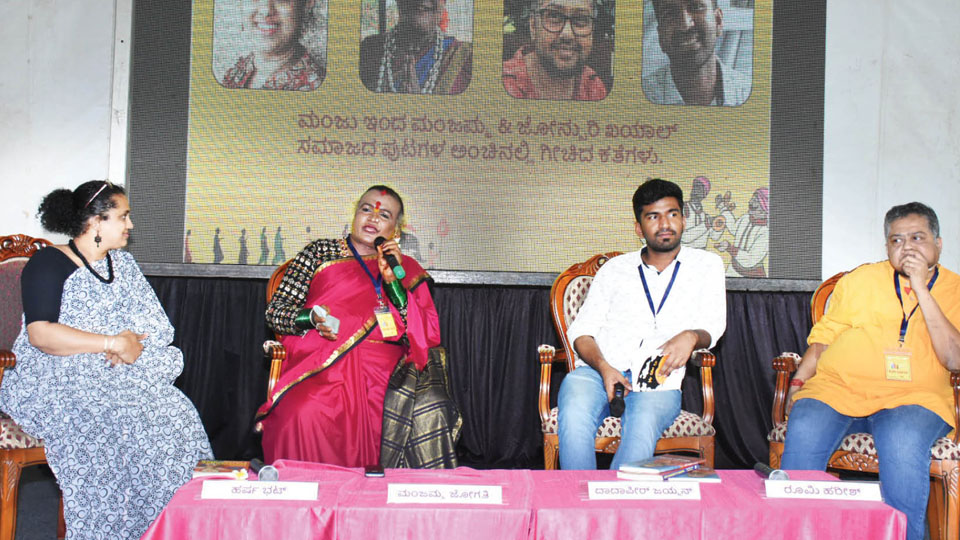Mysore/Mysuru: The session on ‘From Manju to Manjamma and Jonpuri Khayal — stories scribbled on the edges of societal pages’ at the Mysuru Literary Festival made the audience emotional, engrossed and at the same time provoked them to question false social notions, question social hypocrisy and also express anger at how fellow human beings are ill-treated for no fault of theirs.
Narrating the stories of her life, Manjamma Jogathi, the first from the sexual minority community who received the Padma Shri Award said that she had to face a myriad of questions about her existence. Her jobs were not enough so she even resorted to begging but what would a few alms do to her?
Call it a miracle or Manjamma’s intense spirit of not failing in her life, “I was pulled back from the vicious hole of my hardship. And since then, Jogathi Nritya became my religion, practice, my pursuit and my everything. Under the guidance of my gurus, I mastered the dance forms and the Jaanapada songs,” she told the audience.
Manjamma said, “If a child is born, then don’t treat him or her differently, don’t abandon them, respect them as who they are and give them the same rights and privileges you have.”
We are normal just like the rest of you
“What we need from you is to not alienate them. We are normal just like the rest of you and we have the same potential as you or rather more than you. All we yearn for is some love and respect from the people which we rightfully deserve,” she added.
“I hope my life story can send a message to all those who harass us, taunt and abuse us. I hope I can be an example for them and show them that there can be achievers among sexual minorities too. That we must be treated with respect and dignity too,” Manjamma Jogathi said.
Rumi Harish, from an early age, knew that he could not live as a woman. He made the courageous decision to risk everything, including his career as a Hindustani classical musician and his family relationships, in order to stay true to himself. Despite receiving compliments on his voice and appearance, he faced pressure from his audience to conform to gender norms and sing ‘like a girl’ by wearing a saree.
Reproductive aspect of human sexuality
Even within his own home, Rumi had to battle against the expectations of marriage and societal pressure. He expressed that while he understands that not everyone may accept him for who he is, he refuses to be pressured into conformity. “I believe that change must begin within the education system, which currently only recognises the reproductive aspect of human sexuality,” he said, emphasising the importance of promoting tolerance and educating society about caste discrimination.
Throughout his journey, Rumi always desired to marry a woman. However, he faced numerous obstacles and resistance in establishing his own identity. The rigid and patriarchal norms prevailing within his community upheld the notion of the ‘obedient woman’ who adheres to specific vocal pitches and wears a saree.
Rumi, on the other hand, could not envision himself conforming to these expectations. He had to confront the reality that if he did not fit the stereotype of a ‘woman,’ he might lose opportunities to perform in concerts. Many people assumed he had stopped singing altogether once he became an activist. Finally, Rumi bravely came out as a man. Reflecting on the challenges he faced growing up, he acknowledged the immense trauma he endured and can only imagine how much more difficult it must have been for those born before him in less accepting times.
Others in the session were writers Harsha Bhat and Dadapeer Jyman.
For an inclusive and accepting world
The overall message conveyed at the session is that Manjamma Jogathi’s and Rumi Harish’s stories are inspiring and offer hope for a more inclusive and accepting world. It demonstrates that regardless of societal norms, prejudices or barriers, talent and skills can prevail and find recognition.
It reminded the audience that everyone deserves a chance to showcase their abilities and be valued for who they are, regardless of their gender identity. It highlighted the importance of embracing diversity and fostering a sense of solidarity in humanity. By working together and promoting inclusivity, we can create a positive change and contribute to a more equitable society.








Recent Comments